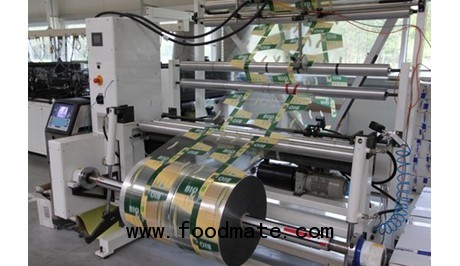
Mediane exports its sleeves to practically all European countries, and via its sales office and warehouse in Richmond (Virginia, USA) to North America and Canada.
Mediane supplies its products to large European retailers such as Aldi, Lidl, C1000, ICA, Asda, Delhaize, Carrefour, Edeka, and Morrisons.
"Over the last few years we have specialised in sleeves for salads and herbs. This focus has resulted in the company achieving a really strong market position. Our customers are satisfied because we pay particular attention to the properties and transparency of the film. We print in High Definition Flexo which provides superior printing quality. In 2011 40% of the sleeves we produced were made from PLA film and 60% from oil-based film (CPP). We expect the proportion of PLA sleeves to increase during the coming years. Our focus will remain on the development of sustainable and renewable films. We intend to replace oil-based packaging with biodegradable films where this is technically and commercially feasible."
Brand management
The company also says it is well prepared to handle other expected changes in the market. "We have taken over some work from the printer. This means that we monitor design work for our customers. This is particularity beneficial for smaller companies. Customers can log in to our server system and view, approve or request modifications to printing images whenever they wish. New designs are placed on the server within two days, enabling customers to react again. This avoids the need to send printer proofs by post and it is a free service. This procedure is unique to us."
That brand management – the monitoring of various designs – is necessary can be seen from the developments in the agricultural and horticultural markets. "We now have to deal with different languages and different texts on packaging. In some cases the number of growers with which retailers work has been quadrupled from two to eight. As a consequence we see that former European themes with multiple languages on packaging are being replaced by designs clearly indicating a country or a region. This might be by using a flag or texts like for instance ‘from the region’ or ‘New Jersey Fresh."
Regulations
European legislation is becoming increasingly tougher. The introduction of FIC (Food Information for Customers) means that in the near future food packaging will have to contain information in several languages that follows established directives and structures. "This will call for increasing flexibility. The printing process and the logistical planning will become more complex, but we are ready for this. Our system is ideally suited to cope with the recent developments and the requirements that will be imposed on it."
The future
Robert van der Laan likes to look ahead to the changes he expects to see in the market in the near future. "We will see increasing types of biodegradable films on the basis of various renewable raw materials, and the application potential of lamination for example will become wider. There will be increasing use of hydroponics and this will require watertight packaging, because the produce will be packed containing moisture.
With our local production in the EU, good logistical organisation both in the EU and USA, fast service in the fields of pre-press, film quality and printing, we are confident about the future. With our specialisation in biodegradable films, I even expect that we have room for further growth."







